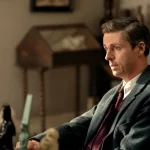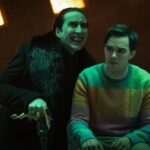At the End of the Day, by Tyler Smith
For as many as there have been, the movie musical remains a surprisingly tricky genre. Adapting anything from the stage can be difficult, as the director is now forcing the audience to essentially be on stage with the actors by way of close-ups. The scenes in a play or musical can seem very reasonable from the comfort of an auditorium seat, but can become downright silly when we’re placed right in the middle of it all. The better musicals manage to maintain an air of theatricality while utilizing the tools of film- namely cinematography and editing- to draw us into the action organically.
Tom Hooper’s Les Miserables, however, is a bit problematic at times. The pacing appears somehow off. There seems to be very little transition from one song to the next; a fact that can be acceptable in a stage setting, where we are allowed a moment while the scene is changed, but disappears when one can merely cut from one scene to the next. Add to that the frustrating art direction and costume design- with its emphasis on gritty realism- and you get a film that seems to be at war with itself. In the quieter moments, when we are allowed to just stare at the desperate expressions on the character’s faces, we feel the real power of who these people are and why we care about them. In these moments, it feels as though we’re watching a straightforward adaptation of the Victor Hugo novel. So, when the singing begins- even after we’ve already heard these characters sing before- it’s surprisingly jarring. It’s as though the film is trying desperately not to be a musical, but is forced to be one.
The end result is a film that is very dour and sluggish, which doesn’t fit with even the most depressing of musicals. There is a lack of vivaciousness here that made the film- all 2 hours and 37 minutes of it- a bit of a slog to get through. Hooper is not allowed the benefit of having intermissions, wherein the audience can process what they’ve just seen as he sets the stage for what is to come- all while giving everybody a needed break. No, the film just keeps trudging along, to the point where we don’t even have the opportunity to reflect on the truly remarkable moments in the film. It’s as if Hooper is saying, “No dilly-dallying thinking about Anne Hathaway! Many more scenes to go! Come on!”
And, to be sure, there really are some great, affecting moments in the film, pretty much all of which come from the cast. Hugh Jackman is on full emotional display here as Jean Valjean, the convict on the run. I’ve long considered Jackman to be an underrated actor, feeling that people dismissed him too easily as that guy that plays Wolverine. While I’ve always felt that Jackman turns out stellar work as Wolverine, it was his performance in The Prestige that made me really excited to see what he would do next. Here, Jackman is totally emotionally exposed as he belts out song after song. While I sometimes have a problem with the characterization of Jean Valjean (which is a function of the storytelling, not the acting), I was always on board with Jackman’s gut wrenching performance.
Many people- myself included- worried that Russell Crowe would be out of his depth as Javert and I’m sad to say that fear is confirmed. I don’t necessarily blame Crowe; he does everything he can and captures the spirit of the dogged inspector, but he just doesn’t have the pipes needed for the role. I’ve seen the musical before and, more than anything, I came away thinking of Javert. In this film, though, the miscasting of Crowe made the character fade into the background when he should be ever-present. It truly is a shame, as I think Russell Crowe would make a great Inspector Javert in a straightforward adapation of the Hugo novel. Between L.A. Confidential, Gladiator, Master and Commander, and many others, Crowe has played his fair share of driven men. Had he not been required to sing, he would have really made the part his own. As more people talk about the film- either positively or negatively- they’ll probably want to take down Crowe for his unremarkable singing voice, but they shouldn’t. As with almost any problem, I’m inclined to lay this at the feet of the director. Crowe should not have been cast.
Just as I walked away from the stage musical thinking of Javert, I exited the film thinking of Anne Hathaway. As Fantine, she has very little screen time, but she takes hold of the character and plays it for all its worth. Her rendition of “I Dreamed a Dream” is everything the song is meant to be. It transcends the specifics of the story and becomes a heartbreaking anthem for everybody whose life did not turn out the way they planned. Her face is full of desperation- mixed with a twinge of resignation- as she infuses the song with operatic emotion. One of my big complaints with musicals has been the emphasis on the singing, as opposed to the acting. It always frustrated me that, as long as a performer could sing well, the acting was considered secondary. Hathaway- wisely shot in an unbroken close up- shows us that it is possible to sing and act all at once, retaining the power of music while giving into emotion.
Amanda Seyfried does well enough as Cosette, but the character is a human MacGuffin. The other characters cry over her, abuse her, protect her, and fall in love with her, and she is allowed a few notable songs, but there is simply nothing there. We don’t know who she is and we don’t particularly care. Seyfried is a fine enough singer, but she does not have the screen presence to engage us through sheer force of will. It is a shame, considering how vital the character is considered to be.
Speaking of Cosette, I was pleasantly surprised by Eddie Redmayne as Marius, the young revolutionary that falls in love with her (for some reason). I first noticed Redmayne in The Good Shepherd and have largely felt that he has never really been given his due as an actor; one need only look at his non-lead leading man in My Week with Marilyn as evidence that he is not really being used to his full potential. As Marius, though, he displays a powerful voice and a wellspring of conflicted emotion. The more he gives himself to the revolution, the less he has for Cosette. Marius shows up fairly late in the film, and we are asked immediately to care about him; casting a strong actor is key to making this happen, and Redmayne does not disappoint.
One should also take note of Samantha Barks as Eponine, the poor girl that secretly opines for Marius. She has a very difficult song- made even more so by the fact that I wasn’t particularly interested in the character- and she knocks it out of the park. Ideally, this character would have been removed, as she only serves to distract from the central story. However, after her moving rendition of “On My Own,” I came to welcome the distraction. In many ways, it is every bit the showstopper that “I Dreamed a Dream” is.
So far, I’ve listed a great number of moving scenes and performances, but I still find the direction of the film mostly lackluster. Hooper’s overuse of the close-up, combined with drab production design, works against the music’s grand scale. While I understand the need to play down some of the theatricality- lest the viewer start to role his eyes at the lofty melodrama- I can’t help but wish he had been more willing to embrace the musical’s stage roots. A notable exception is the “Master of the House” sequence, in which Sacha Baron Cohen and Helena Bonham Carter play a pair of sleazy innkeepers, celebrating their own treachery. The song is meant as comic relief and thus there is a much more jaunty tone to the sequence. The sequence is more than that, though, as Hooper seems to finally get into the spirit of the production. We see multiple people dancing and laughing as we get quick cuts to Cohen and Carter pickpocketing the possessions of their customers. In this moment, there is a nice theatricality in the choreography and cinematography, all while being undeniably filmic, with the editing allowing us to see smaller, subtler moments that a stage production never could.
The vitality to the “Master of the House” scene only serves to underscore the general shrug of the rest of the film. It really is a shame that so solid a musical, populated with talented performers, could be made into such a run-of-the-mill, perfunctory film. Is it worth seeing? I think so, if for no other reason than because some of those performances deserve to be seen and appreciated. But, given the material, the budget, and the talent, Tom Hooper’s Les Miserables not only could have been better, but it damn well should have been.































I saw the film a few days back and I really can’t agree with your assessment here, Tyler. It really stuck with me. I found nearly the entire enterprise to be thrilling and involving. In regards to the length, I felt it but didn’t mind it in the sense that the film covers nearly 20 years and I felt that the length helped sell the passage of that time.
Nevertheless, this is not a film I’d defend vociferously. The quality of a film is always a matter of subjectivity, but I feel like this is a special case. The nature of the source material eschews subtlety (this applies to the novel as well). Adding the film’s conceivably alienating aesthetics (which even I found occasionally irritating) and you have a strange beast, a beast I loved all the same.
Suggesting that Eponine’s character be removed fom Les Miserables is a bit absurd. Anyone even remotely familiar with the play would have stormed out of the theater, as “On My Own” is a fan favorite. Removing this moment would have been a terrible decision. she aslo clearly serves as an unfortunte foil character to Cozette. She reminds us that love’s price is often sacrifice, a clear theme in the story.
I’m not saying the song is bad, by any stretch of the imagination. I think it’s one of the better moments of the film. However, it wouldn’t be the first instance of a fan favorite being removed for pacing issues. “God, That’s Good” was removed from the film adaptation of SWEENEY TODD (whether or not that was to the film’s detriment is debatable). A lot of people weren’t really sure why it was removed, but I think it’s because there were no intermissions in the film. Act I ends with “A Little Priest,” which is an integral song that reveals character and moves the plot along. Then, intermission, followed by “God, That’s Good.” Without the intermission, there would be two show stopping numbers in a row, which would then detract from the power of both. So, Burton decided to remove a song that fans love, but that wouldn’t work within the context of a film adaptation.
I’m not suggesting that “On My Own” or Eponine should have been removed. Only that they very well could have been and that the film adaptation- which already suffers from major pacing issues- would have been more streamlined as a result.
And to respond to the comment above, I have no problem with a movie being 157 minutes long. But a director has to have a real command of pacing and tone to be able to justify that length. Hooper, I think, does not, and so that 157 minutes is jarring, thus making it not altogether pleasant.